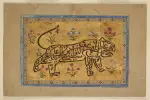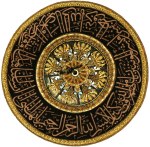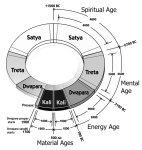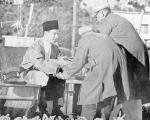 Navruz in Persian means a new day. In the Persian calendar it is the New Year’s day. It is a very significant occasion in our tradition as many important and significant events took place on the day. According to a tradition related to Imam Imam Jafar al-Sadik, “It was on Navroz that Adam was created, that God made a covenant with the souls, that Abraham destroyed the pagan idols, that the Prophet of Islam received first revelation, that the Prophet took Ali on his shoulders to smash 360 idols in Mecca, and most important of all, that he declared Ali as his legitimate successor.”
Navruz in Persian means a new day. In the Persian calendar it is the New Year’s day. It is a very significant occasion in our tradition as many important and significant events took place on the day. According to a tradition related to Imam Imam Jafar al-Sadik, “It was on Navroz that Adam was created, that God made a covenant with the souls, that Abraham destroyed the pagan idols, that the Prophet of Islam received first revelation, that the Prophet took Ali on his shoulders to smash 360 idols in Mecca, and most important of all, that he declared Ali as his legitimate successor.”
The Ginan Gist – By Karim Maherali
Since Navroz occurs on the first day of spring, and it signifies the transformation of nature and life from the dreary and dark period of winter into the light and freshness of spring, it is symbolic of the rejuvenation and transformation of the soul from the state of darkness of ignorance and forgetfulness into the light of constant joy and awareness through spiritual enlightenment. This Ginan is about the physical encounter between Sayyed Fateh Ali Shah and the Imam of the time Shah Khalilullah on the day of Navroz and the resulting transformation of the soul that occurred in the life of the murid. It conveys important attitudes and values in the context of the relationship between a murid and the Mursheed.
navaroj nā dhin sohāmṇā
Audio
| # | Artist | Audio (without music) |
|---|---|---|
| 1 | Shamshu Bandali Haji (Alwaez) |
Transliteration, Translation and Commentary
| Eji Navaroj naa din sohaamannaa,
sri hari Kaayaam shikaar ramavaa van gayaa; sevak naa man thayaa udaasi, paraan hari charanne raheaa……………1 |
O momins! On the glorious day of Navroz, the honorable Lord of Resurrection went to the woods to hunt. The heart of this servant was plunged into sadness, nevertheless the soul was longing to be at the feet of the Lord.
Comment: When the Sayyed arrived at the abode of the Imam for audience, the Imam left and went hunting. The murid was saddened by this but nevertheless was eager to be at the feet of the Imam. This incidence is symbolic of the fact that we may strive very hard to reach the Imam for spiritual enlightenment, but the ultimate moment of enlightenment is entirely up to him. He decides where and when to grant that ultimate experience.
| Eji Sri Kaayam prite jo chint baandhi
Nar ne prite ame van gayaa evaa van sohaamannaa shri saaheb ditthaa, delaa dai devataa raheaa……………2 |
O momins! As my thought was so bound to the honorable Lord of Resurrection in devotion, I went to the woods in loving anticipation of the Master. The woods where I encountered the honorable Master seemed magnificent as if angels had put their hearts in it.
Comment: Upon spiritual enlightenment the senses are transformed and sharpened. Everything around seems bright and beautiful with angelic presence.
| Eji Bhalun thayun saahebe sumat aali
shri hari Kaayam saathe ramavaa ame van gayaa anat aashaa puri hamaari, dev dil bhaave gameaa……………3 |
O momins! What a blessing it was that I was inspired by the Lord to go to the woods. I accompanied the Lord of Resurrection in the woods to play. He fulfilled all my untold wishes, for God filled my heart with bliss.
Comment: This verse alludes to the blissful nature of experience in the company of the Imam after enlightenment whether in His physical presence or not.
| Eji Hete hari sun hirakh baandho
avichal rang saaheb se giraheaa evi chint baandhi Nar Kaayam saathe sat bhanddaar motie bhareaa……………4 |
O momins! In love I was bound to God in ecstasy. I was filled with enduring delight from the Master. Having bound my thought in Him in such a manner, the treasury of truth was filled with pearls.
Comment: When the mind is completely focussed on the object of its attention and veneration, it is the subject merging into the object and thereby losing its own identity in the process and obtaining boundless and heavenly riches. Mowlana Sultan Muhammad Shah in the final paragraph of his Memoirs refers to this:
Life in the ultimate analysis has taught me one enduring lesson. The subject should always disappear in the object. In our ordinary affections one for another, in our daily work with hand or brain, most of us discover soon enough that any lasting satisfaction, any contentment that we can achieve, is the result of forgetting self, of merging subject with object in a harmony that is of body, mind and spirit. And in the highest realms of consciousness all who believe in a Higher Being are liberated from all the clogging and hampering bonds of the subjective self in prayer, in rapt meditation upon and in the face of the glorious radiance of eternity, in which all temporal and earthly consciousness is swallowed up and itself becomes the eternal.
| Eji Ame saaheb saathe sahel kidhaa
ridh sidhaj paameaa ek man ginaan je saambhale, aa jiv tenaa odhareaa……………5 |
O momins! I journeyed with the Lord, and gained real prosperity and success. The souls of those who listen to the Ginan with full attention are saved.
Comment: This further alludes to the life lived in companionship with the Imam. Real prosperity and success is achieved. The Ginans inspire one to be in constant awareness of the real purpose of life and hence prevent error and forgetfulness.
| Eji Jiv jaare jugat paame
praann pope ram raheaa; agar chandan parem raseaa, hete hans sarovar jiliaa……………6 |
O momins! When the soul finds the Way, life blooms like a flower. Mingled with adoration, it becomes fragrant as aloe or sandal. With love the swan swims on the lake.
Comment: The swan swimming on the lake is symbolic of a life detached from materialism due to constant awareness of the higher dimension and the accompanying bliss.
| Eji Gaddh chakavaane kile Shaahaa Khalilaa rame
tyaan Fateh Ali ne mayaa karine bolaaveaa anat aashaa puri hamaari, nit hari nure utthaa……………7 |
O momins! When Shah Khalilullah went to inspect the fortress, he graciously summoned Fateh Ali there. My hopes untold were fulfilled, and the Lord appeared in light for ever.
Comment: This incident alludes to perhaps another encounter with the Imam after which he was filled with the light forever – once in light always in light.
| Eji Bhaai re moman tame bhaave aaraadho
bhanne Shamasi tame saambhalo rukhi saaheb naa gunn nahin visaare, tenaa paraan nahin thaashe dukhi……………8 |
O momins! O brother believer, worship Him with feeling. The follower of Pir Shams says: listen, O believer. Those who do not forget the virtues and blessings of the Master will not be grieved in heart.
Comment: Those who have been blessed with the higher graces and benefits of the Imam will never feel grieved even by material losses as they are in possession of something far superior.
Ginan Series – By Karim Maherali
 Abdulsultan Maherali: Ginan in the presence of Mawlana Hazar Imam - Upon becoming the Imam, Mawlana Hazar Imam took a year off from Harvard where he… Abdulsultan Maherali: Ginan in the presence of Mawlana Hazar Imam - Upon becoming the Imam, Mawlana Hazar Imam took a year off from Harvard where he… Ginans: Our Wonderful Tradition – Ismailimail launches a new series - Ismailimail in collaboration with the alumni of the IIS Karim Maherali, launches a new weekly… Ginans: Our Wonderful Tradition – Ismailimail launches a new series - Ismailimail in collaboration with the alumni of the IIS Karim Maherali, launches a new weekly… Ginan: Ginan bolo re nit – Recite Ginans everyday! - Ismailimail in collaboration with Karim Maherali launches a Ginan series which will contain a transliteration… Ginan: Ginan bolo re nit – Recite Ginans everyday! - Ismailimail in collaboration with Karim Maherali launches a Ginan series which will contain a transliteration… Ginan: Aanand aanand kariyo rikhisaro – Rejoice, rejoice o believers! - In this second Ginan of the series, Karim Maherali shares the translation with insight, corroborating… Ginan: Aanand aanand kariyo rikhisaro – Rejoice, rejoice o believers! - In this second Ginan of the series, Karim Maherali shares the translation with insight, corroborating… Qasida: Dur ze daryayi haqiqat – The pearl of the ocean of truth - Karim Maherali shares his insights and knowledge interpreting Nasir Khusraw’s Qasida: Dur ze daryayi haqiqat,… Qasida: Dur ze daryayi haqiqat – The pearl of the ocean of truth - Karim Maherali shares his insights and knowledge interpreting Nasir Khusraw’s Qasida: Dur ze daryayi haqiqat,… Ginan: Gat maa(n)he aavine – Having come to the congregation - In this third Ginan of the series, Karim Maherali shares the translation with commentary of… Ginan: Gat maa(n)he aavine – Having come to the congregation - In this third Ginan of the series, Karim Maherali shares the translation with commentary of… Ginan: Duniya Sirajine Shaah More – Having created the world my Lord - By Karim Maherali The Ginan Gist This Ginan is about the purpose of creation which… Ginan: Duniya Sirajine Shaah More – Having created the world my Lord - By Karim Maherali The Ginan Gist This Ginan is about the purpose of creation which… Ginan: Haq to paak tu baadshaah – You are the Truth and the Pure Majestic King - By Karim Maherali The Ginan Gist This Ginan can be considered as the Shia tafsir… Ginan: Haq to paak tu baadshaah – You are the Truth and the Pure Majestic King - By Karim Maherali The Ginan Gist This Ginan can be considered as the Shia tafsir… Ginan: Aae rahem rahemaan – As Mercy is from you, O Merciful - The Ginan Gist – By Karim Maherali This Ginan is about what it entails to… Ginan: Aae rahem rahemaan – As Mercy is from you, O Merciful - The Ginan Gist – By Karim Maherali This Ginan is about what it entails to… Ginan: Dhan dhan aajno daaddlo – It is an auspicious day today - The Ginan Gist – By Karim Maherali This Ginan is a Khushyally Ginan which is… Ginan: Dhan dhan aajno daaddlo – It is an auspicious day today - The Ginan Gist – By Karim Maherali This Ginan is a Khushyally Ginan which is… Ginan: Ye mitthaa Muhammad naam – The name Muhammad is sweet - The Ginan Gist – By Karim Maherali The Holy Qur’an provides us with contrasting perspectives… Ginan: Ye mitthaa Muhammad naam – The name Muhammad is sweet - The Ginan Gist – By Karim Maherali The Holy Qur’an provides us with contrasting perspectives… Qasida: Ya Imami Ya Imami – O my Imam, O my Imam - The Qasida Gist – By Karim Maherali This is a Qasida composed in Arabic by ‘Ali… Qasida: Ya Imami Ya Imami – O my Imam, O my Imam - The Qasida Gist – By Karim Maherali This is a Qasida composed in Arabic by ‘Ali… Ginan: Pahelaa Kartaa Jug Maa(n)he Shaahnaa – In the first age of Karta Lord’s… - The Ginan Gist – By Karim Maherali Our Tariqah being an esoteric tradition which has… Ginan: Pahelaa Kartaa Jug Maa(n)he Shaahnaa – In the first age of Karta Lord’s… - The Ginan Gist – By Karim Maherali Our Tariqah being an esoteric tradition which has… Ginan: Taariye tu taarannhaar Khudavind – O God save us because you are the only saviour - The Ginan Gist – By Karim Maherali According to the Shia interpretation of the verse… Ginan: Taariye tu taarannhaar Khudavind – O God save us because you are the only saviour - The Ginan Gist – By Karim Maherali According to the Shia interpretation of the verse… Ginan: Kheddo kheddo jemaani naavddi – Sail skillfully in the boat - The Ginan Gist – By Karim Maherali This Ginan depicts the purpose of life by… Ginan: Kheddo kheddo jemaani naavddi – Sail skillfully in the boat - The Ginan Gist – By Karim Maherali This Ginan depicts the purpose of life by… Ginan: Kesaree see(n)h Sarup Bhulaayo – The saffron colored lion forgot its identity - The Ginan Gist – By Karim Maherali This Ginan is about overcoming the state of… Ginan: Kesaree see(n)h Sarup Bhulaayo – The saffron colored lion forgot its identity - The Ginan Gist – By Karim Maherali This Ginan is about overcoming the state of… Ginan: Sakhee maree aatam naa odhaar – O my Friend! O Saviour of my soul - The Ginan Gist – By Karim Maherali The Holy Qur’an States: “We will show them… Ginan: Sakhee maree aatam naa odhaar – O my Friend! O Saviour of my soul - The Ginan Gist – By Karim Maherali The Holy Qur’an States: “We will show them… Ginan: Saamee tamaaree vaddee maa(n)he – O Lord in your garden - The Ginan Gist – By Karim Maherali This Ginan conveys the vision of creation as… Ginan: Saamee tamaaree vaddee maa(n)he – O Lord in your garden - The Ginan Gist – By Karim Maherali This Ginan conveys the vision of creation as… Ginan: Maal khajinaa bohotaj bhariya – Though you may have filled many treasuries with riches - The Ginan Gist – By Karim Maherali This Ginan highlights the illusory and fleeting nature… Ginan: Maal khajinaa bohotaj bhariya – Though you may have filled many treasuries with riches - The Ginan Gist – By Karim Maherali This Ginan highlights the illusory and fleeting nature… Ginan: Aasmaanee ta(m)bal vaajeeya – The heavenly trumpets have sounded - O momins! The time will move very quickly; a year will seem like ten days and the days will flow swiftly like water: This Ginan is about the significance of spiritual enlightenment in the life of an individual murid. Ginan: Aasmaanee ta(m)bal vaajeeya – The heavenly trumpets have sounded - O momins! The time will move very quickly; a year will seem like ten days and the days will flow swiftly like water: This Ginan is about the significance of spiritual enlightenment in the life of an individual murid. Ginan: Kalpat jalpat maayaa e mohee – Mirage-like and false is this illusory existence in which my soul is attached - The Ginan Gist – By Karim Maherali This Ginan is about the nature of our… Ginan: Kalpat jalpat maayaa e mohee – Mirage-like and false is this illusory existence in which my soul is attached - The Ginan Gist – By Karim Maherali This Ginan is about the nature of our… Ginan: Shaamku aavan(n)taa jo kahe – Those who inform about the arrival of the Imam - The Ginan Gist – By Karim Maherali This Ginan is about the uniqueness of the… Ginan: Shaamku aavan(n)taa jo kahe – Those who inform about the arrival of the Imam - The Ginan Gist – By Karim Maherali This Ginan is about the uniqueness of the… Ginan: Navroz naa din sohaamnnaa – On the glorious day of Navroz - Navruz in Persian means a new day. In the Persian calendar it is the New… Ginan: Navroz naa din sohaamnnaa – On the glorious day of Navroz - Navruz in Persian means a new day. In the Persian calendar it is the New… Qasida: Ta Surato Paiwande Jahan Bud Ali Bud – Ali the ever present - The Qasida Gist – By Karim Maherali The Holy Quran (4:174) states: “O mankind! Verily… Qasida: Ta Surato Paiwande Jahan Bud Ali Bud – Ali the ever present - The Qasida Gist – By Karim Maherali The Holy Quran (4:174) states: “O mankind! Verily… Ginan: Ab teree mohabat lagee – Now I am in love with you - The Ginan Gist – By Karim Maherali This Ginan is an expression of love and… Ginan: Ab teree mohabat lagee – Now I am in love with you - The Ginan Gist – By Karim Maherali This Ginan is an expression of love and… Ginan: Jaag jaagre tun jaag – Wake up, wake up, o you, wake up - The Ginan Gist – By Karim Maherali This Ginan is about the importance of remaining… Ginan: Jaag jaagre tun jaag – Wake up, wake up, o you, wake up - The Ginan Gist – By Karim Maherali This Ginan is about the importance of remaining… Ginan: Ek teerath vedhddaa – Admonishing a caravan going for the teerath - The Ginan Gist – By Karim Maherali. Brief note about the raag (tune) by Aly… Ginan: Ek teerath vedhddaa – Admonishing a caravan going for the teerath - The Ginan Gist – By Karim Maherali. Brief note about the raag (tune) by Aly… Ginan: Til bhaar tulannaa – Sesame seed’s weight will be accounted for - This Ginan is about what will happen to the souls when they depart from this world highlighting the nature of accountability and the provisions that one needs to take along with him/her to enjoy the felicity of the hereafter. Ginan: Til bhaar tulannaa – Sesame seed’s weight will be accounted for - This Ginan is about what will happen to the souls when they depart from this world highlighting the nature of accountability and the provisions that one needs to take along with him/her to enjoy the felicity of the hereafter. Ginan: Satna sarovar saraasar bhariya – The Lake of truth is brimful - This Ginan highlights the importance of keeping the soul constantly refreshed and protected through the proper observance of rites and rituals and ethical conduct Ginan: Satna sarovar saraasar bhariya – The Lake of truth is brimful - This Ginan highlights the importance of keeping the soul constantly refreshed and protected through the proper observance of rites and rituals and ethical conduct Ginan: Dur desh thee aayo vannjaaro – You have come from a distant country, o travelling trader - This Ginan highlights the transitory nature of our existence in this world by way of the imagery of a travelling trader and that all our actions are dealings with the world and are a means of attaining the ultimate objective of meeting the Imam. Ginan: Dur desh thee aayo vannjaaro – You have come from a distant country, o travelling trader - This Ginan highlights the transitory nature of our existence in this world by way of the imagery of a travelling trader and that all our actions are dealings with the world and are a means of attaining the ultimate objective of meeting the Imam. Ginan: Ham dil khaalak Allah sohi vase ji – My heart is the creation and Allah resides therein - This Ginan highlights the esoteric dimension of our Tariqah with respect to the notion of a Perfect Man as a macrosm of creation in whose heart the entire creation is reflected and in whom the Divine fully manifests and hence expresses the Divine will par excellence. Ginan: Ham dil khaalak Allah sohi vase ji – My heart is the creation and Allah resides therein - This Ginan highlights the esoteric dimension of our Tariqah with respect to the notion of a Perfect Man as a macrosm of creation in whose heart the entire creation is reflected and in whom the Divine fully manifests and hence expresses the Divine will par excellence.  Ginan: Unchaa re kot bahu vechana – Your abode is at an elevated fort far away - This Ginan highlights the need to constantly be aware and engage in the quest for the ultimate purpose and meaning which is crowned by the gift of Darshan (Vision) Ginan: Unchaa re kot bahu vechana – Your abode is at an elevated fort far away - This Ginan highlights the need to constantly be aware and engage in the quest for the ultimate purpose and meaning which is crowned by the gift of Darshan (Vision) Ginan: Aaj aanand paamiya man ke – Today this mind (heart) has attained joy - The essential message of this Ginan is to abandon the false worship of the idols. Ginan: Aaj aanand paamiya man ke – Today this mind (heart) has attained joy - The essential message of this Ginan is to abandon the false worship of the idols. Ginan: Swaami-ne saachu(n) karine sreviye – By considering the Imam to be true, be devoted to him - This is a lengthy Ginan which covers many aspects of our faith - importance and benefits of following the Imam of the time Ginan: Swaami-ne saachu(n) karine sreviye – By considering the Imam to be true, be devoted to him - This is a lengthy Ginan which covers many aspects of our faith - importance and benefits of following the Imam of the time Ginan: Shahnaa khat aayaa viraa Jampudeep maa(n)he – The Imam’s letter has arrived in the Indo-Pakistan subcontinent - This Ginan is called a Talika Ginan. It is recited on the occasion of the reading of Mowlana Hazar Imam's messages to the Jamat Ginan: Shahnaa khat aayaa viraa Jampudeep maa(n)he – The Imam’s letter has arrived in the Indo-Pakistan subcontinent - This Ginan is called a Talika Ginan. It is recited on the occasion of the reading of Mowlana Hazar Imam's messages to the Jamat Ginan: Hetesu(n) milo re munivaro – With love and affection meet, O the best of ascetics - This Ginan highlights the ultimate purpose of our existence: to enjoy the Vision of God Ginan: Hetesu(n) milo re munivaro – With love and affection meet, O the best of ascetics - This Ginan highlights the ultimate purpose of our existence: to enjoy the Vision of God Munaajaat: Ya Aly Khoob mijaalas jeenat karke – O Aly, in the fair assembly gloriously adorned - Munaajaat Gist: By Karim Maherali. Brief note about the raag (tune) by Aly Sunderji. A… Munaajaat: Ya Aly Khoob mijaalas jeenat karke – O Aly, in the fair assembly gloriously adorned - Munaajaat Gist: By Karim Maherali. Brief note about the raag (tune) by Aly Sunderji. A… Ginan: Hu(n) re piyaasi piya tere darshanki – I thirst, o Beloved, for a vision of You - The Ginan Gist – By Karim Maherali. Brief note about the raag (tune) by Aly… Ginan: Hu(n) re piyaasi piya tere darshanki – I thirst, o Beloved, for a vision of You - The Ginan Gist – By Karim Maherali. Brief note about the raag (tune) by Aly… Ginan: Saahebjee tu(n) more man bhaave – O Imam! You are dear to my heart (mind) - The Ginan Gist – By Karim Maherali. Brief note about the raag (tune) by Aly… Ginan: Saahebjee tu(n) more man bhaave – O Imam! You are dear to my heart (mind) - The Ginan Gist – By Karim Maherali. Brief note about the raag (tune) by Aly… |
Previously on Ismailimail…





like it. specially audio track of Navroz na din sohamana by Al-waiz shamsuddin Haji. regards.
LikeLike